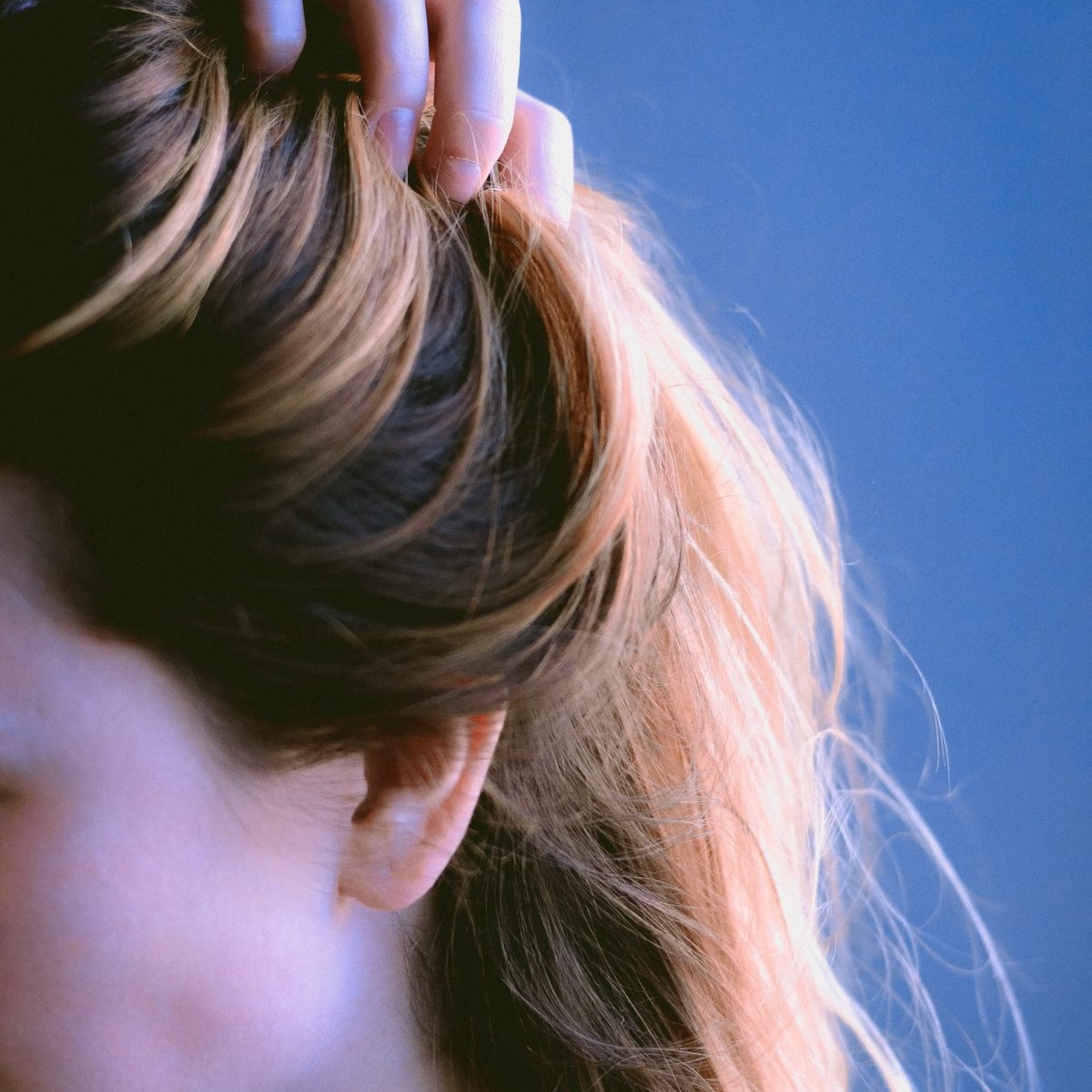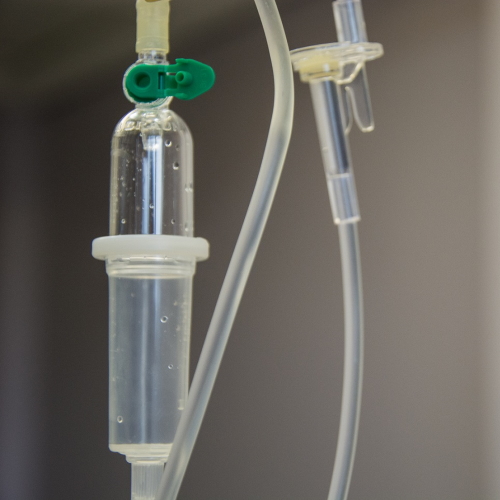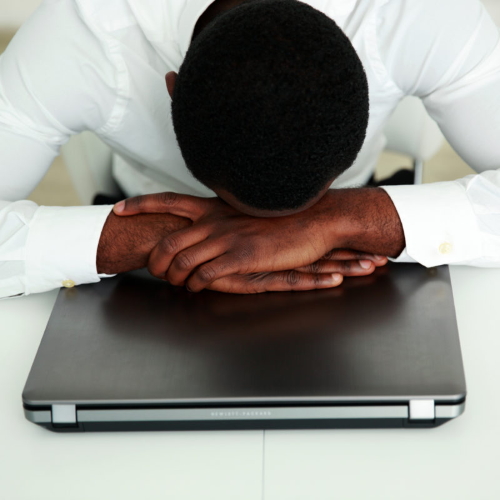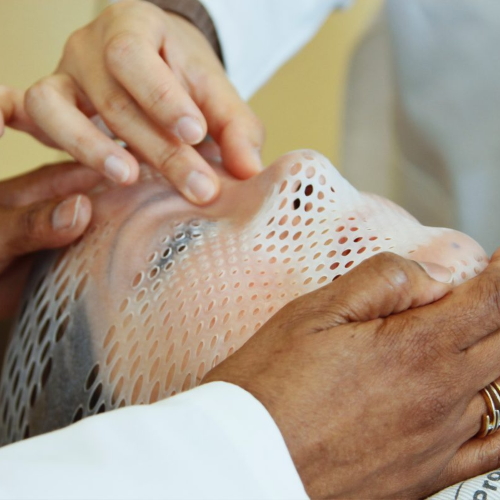Taxol, Hair Loss & The Inevitable New ‘Do
Rebecca’s Story
My diagnosis
When I was first diagnosed with Stage 3A, ER+, Ductal Breast Cancer nearly a decade ago, my thoughts bounced from one horror story to another, stories I’d heard from relatives, friends, cousin’s boyfriend’s stepmother’s nephew, and (gasp) the internet.
The voice in my head that narrates my daily life went from Bridget Jones to Pooh’s Eeyore. It also sounded very far away as if my head and body were no longer connected. I was clearly disassociating from the conversation, the conversation where I was asking all the usual questions, the conversation where I was getting all the dreaded answers.
“Will I need treatment beyond surgery?” Yes.
“Will that include chemo?” Yes.
“Will I lose my hair?” Yes.
Processing my emotions
Why does losing one’s hair cause the waterfall of tears that even the diagnosis doesn’t? I was trying hard to not be that person, that patient. You know the one. The person who devolves into a blubbering, snot-nosed mess as soon as the C-word is uttered aloud. Stoicism was the name of the game. But then we got to the hair loss part, and my eyes began to sting as they filled with big, salty teardrops. And as the tears spilled over my lids and soaked my cheeks, I realized that I was somehow more upset by the impending loss of hair than I was by the possible impending loss of life.
Now, obviously I was devastated by the cancer diagnosis. But processing the very big feelings I was having over the diagnosis, during that initial discussion with my oncologist, wasn’t an option. There were too many emotions and I didn’t want to break down right there, right then. So I needed something smaller, something more manageable to focus on, to redirect my feelings towards. And losing my hair, my long, lovely, maple hair was it.
I left the doctor’s office in a stupor, drove home in a daze, and crumbled as soon as I shut my apartment door behind me.
I had cancer.
I was going to lose my hair.
I had cancer and because I was going to lose my hair, I’d be a walking neon sign for SICK.
Losing my hair not only meant I’d lose the privacy that I’d hoped would accompany my diagnosis, it meant the loss of a part of me. It meant the loss of health and normalcy.
Common Taxol side effects
I didn’t find out for several weeks, post-surgery, what my particular chemo cocktail would be. It would include Taxol. Common side effects from Taxol include:
- Diarrhea
- Neuropathy
- Pain (in joints)
- Allergic reaction
- Hair loss
Now, it might surprise you to learn that not all chemo drugs cause hair loss. In fact, some chemo drugs rarely cause hair loss. But Paclitaxel, or Taxol as it’s more commonly known, is the top-selling cancer drug in the United States according to the National Cancer Institute. And it’s used regularly to treat breast, lung, and ovarian cancers. So naturally, it was the drug of choice for my oncologist. This meant certain hair loss.
All cancer patients know that the journey is fraught with lifesaving, side-effect inducing treatments. But some of us, among the various effects of constipation, diarrhea, appetite loss, fertility treatments, and so on, must also deal with the very visible and very recognizable aspect of our illness — the loss of our hair.
So why does Taxol and some other cancer drugs cause our hair to fall out? According to Dr. Doug Blayney, a breast cancer specialist at Stanford Medical Center, “Chemotherapy damages fast-growing cells… [T]he fast-growing cells in the body may be the cancer cells… the other fast growing cells are in the hair.”
Getting ready to lose it
I wasted no time in preparing for my first of eight rounds of chemotherapy. There didn’t seem to be much reason to delay the inevitable and I was fairly certain that watching my hair fall out incrementally, in clumps, would be far more traumatic. So I did exactly what I’d seen so many brave women before me do, I took clippers to my hair.
I admit, I learned that I have a reasonably nice shaped head. Still as a quality of life factor, my self esteem took a significant hit. I still looked like me. Yet, not like me. I was sick, and there was no hiding it.
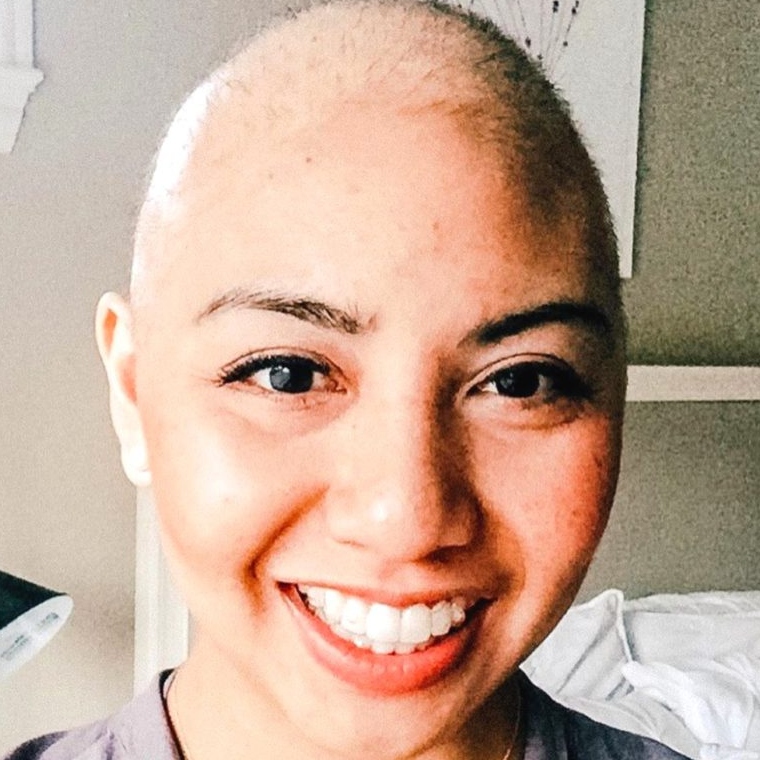
[Hair loss] didn’t help with the fact that I already didn’t feel feminine. I’m not saying hair is everything, but hair was part of my identity and always has been.
Rach, Invasive Ductal Carcinoma, Stage 2, Triple Positive
My hair was just a part of the puzzle. My skin didn’t feel like me. Every part of me felt foreign. I would joke that I looked cancer-y. I looked like I felt.
Arielle, Non-Hodgkin Lymphoma (Non-Hodgkin’s)
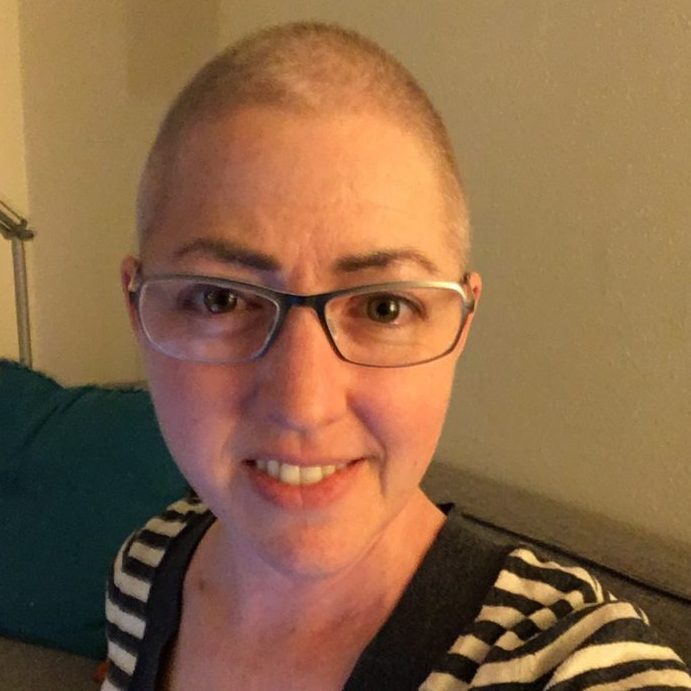
My hair loss was almost immediate. I remember waking up one morning after my first round to find very short, fine hairs on my pillowcase. It had begun.
In a few short weeks, I had gone from having lovely, long locks to a buzzed head to being fully bald. And cold. Extremely cold. No one had warned me that my head would be so cold! Between recovering from being mellon-balled, fighting nausea from chemo, and managing hopelessness, I hadn’t had time to consider how much warmth my hair provides to so very many body parts and exactly how many body parts would be affected:
- Legs
- Pubis
- Face
- Arms
- Armpits
For me, the hair loss was thorough and complete. I even lost my eyelashes.
Personal stories
While so many of us endure cancer treatment-related hair loss, our individual experiences remain deeply personal.
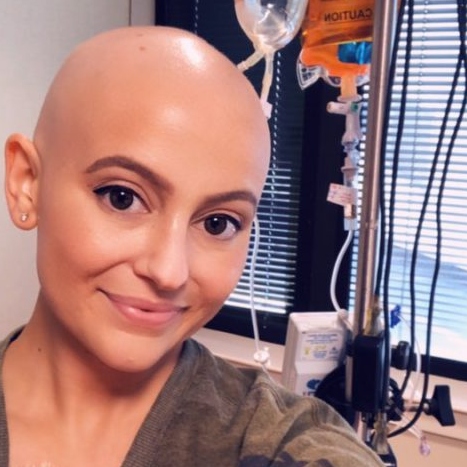
[Hair loss] wasn’t a big deal for me when it happened. I would just rock a light beanie or go bald and proud. The hair loss on my face was more difficult because I have always had very thick eyelashes and eyebrows so I didn’t enjoy that by any means.
Keyla, Non-Hodgkin Lymphoma(Primary Mediastinal, Stage I)
I documented videos of me talking about my experience [with hair loss] and being vulnerable about the experience. It allowed me a space to share the honest truth. To have people see that side that for a lot of females they don’t discuss because it’s hard or they’re afraid or ashamed of it. Sharing this made me feel invincible.
Nina, stage 4 diffuse large b-cell lymphoma
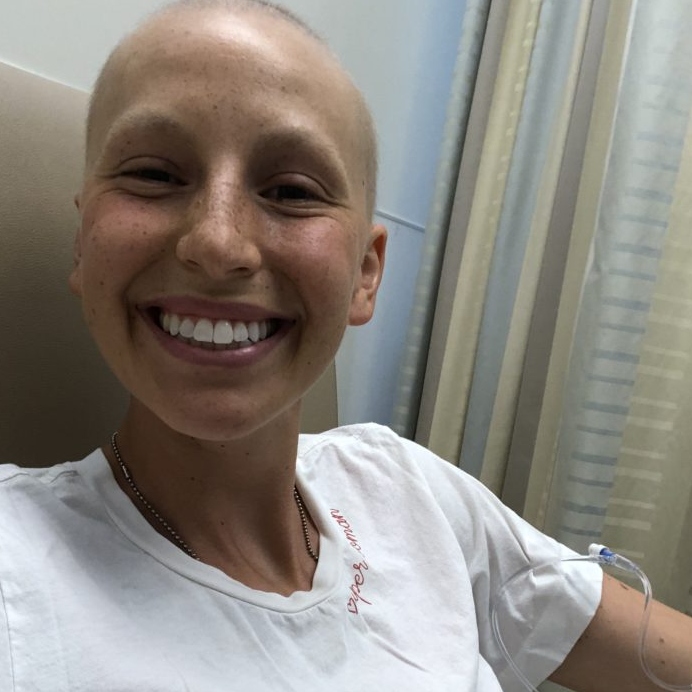
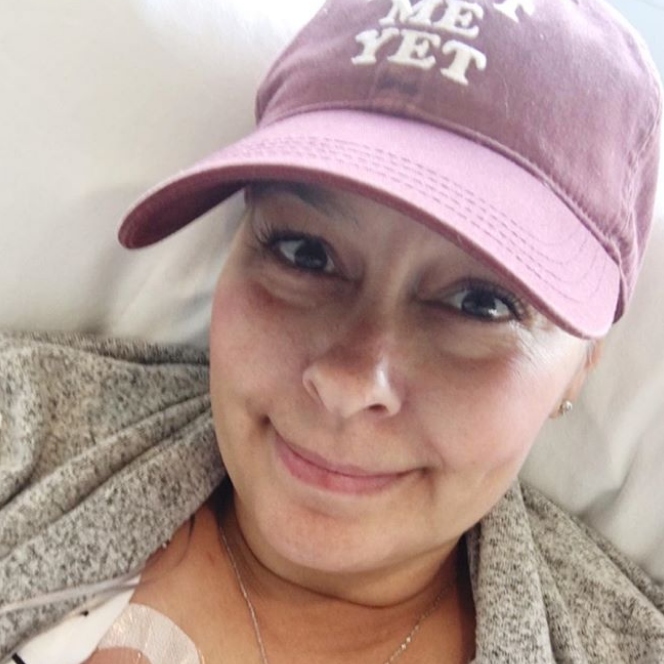
I’m a vain person. So I’m shocked at the fact that the hair loss didn’t bother me. I was more concerned about getting the meds in me and getting the cancer gone.
Renee, Invasive Ductal Carcinoma (IDC),HER2+, Stage 3, Relapse, Stage 4
What helped us
The simple item that really helped me rally once I’d lost all of my hair was beanies, lots and lots of beanies. I went through chemo during the summer months, so a light fabric covering was exactly what I needed.
Some items that have helped other survivors ease the trauma and transition of hair loss are:
- Beanies
- Wigs
- Cold Caps
- Baseball caps
- Baseball cap with hair attached to sides
- Scarves
- Just you! Keyla reminds us that bald and bold is beautiful!
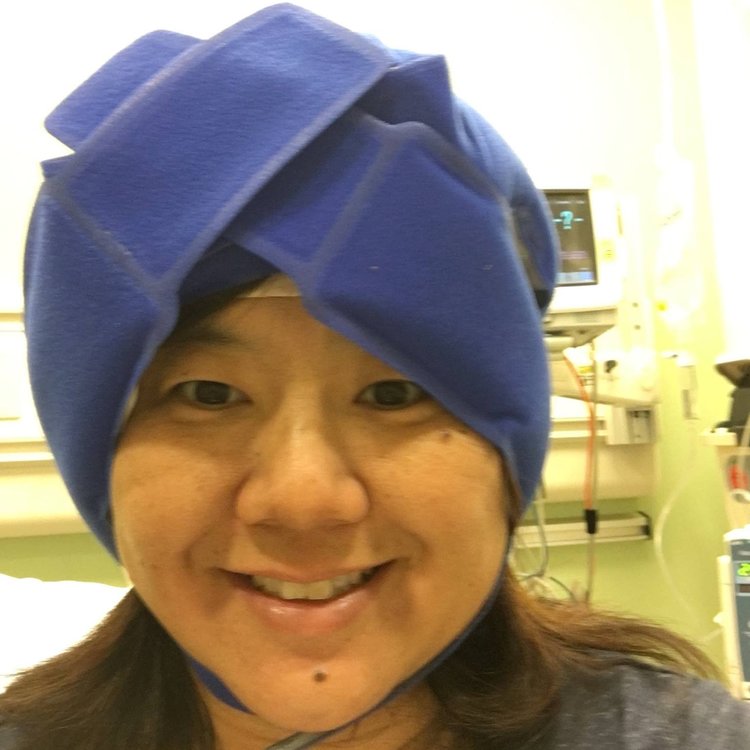
Actually the hardest part of my chemo treatment was the [Penguin] cold caps. By the end, I was just wiped out and it’s like a brain freeze that entire time and a headache. I did lose some hair. I saved about 60%… They are expensive, about $1500 to rent.
Margaret, Invasive Ductal Carcinoma (IDC) & Ductal Carcinoma In Situ (DCIS)
When my hair finally started to grow again, it grew back as chemo curls. My leg hair also, sadly, grew back. I would have been quite happy if it hadn’t. My new eyebrows were pointed in every possible direction and refused to lay flat, and my eyelashes were so sparse, I was certain I’d never again be able to wear mascara. The slow growth of my eyelashes became my biggest concern. So, after much research, I decided to try VEGAMOUR. Coming on the heels of having an insane amount of chemicals pumped into my body regularly, I was drawn to VEGAMOUR’S $59 non-toxic, vegan serum. And it worked! I was wearing thick black mascara less than a year after the completion of chemo.
Getting cancer, having cancer, undergoing surgeries, ingesting and infusing toxic drugs, having your flesh burned and scarred from radiation, our bodies are beaten up, bruised and broken. I think that’s why we often feel that losing our hair is akin to suffering one final indignity. Cancer takes so very much from us. To take a significant part that we’re taught to believe contributes to our beauty and desirability is nearly unbearable at times. Yet, each of us, in our own way, find the strength to endure it, to survive it. Whether with wigs, caps, or leaning into our natural state, we survive it.
